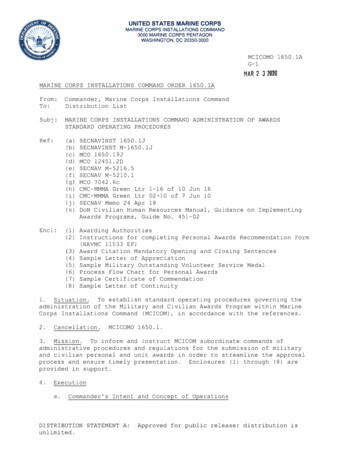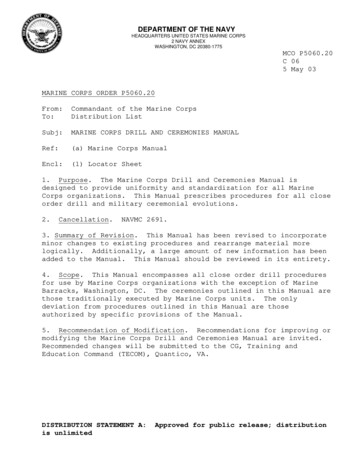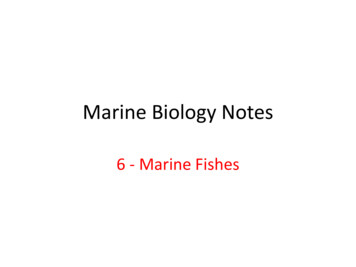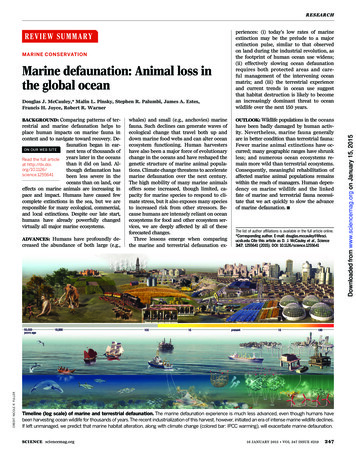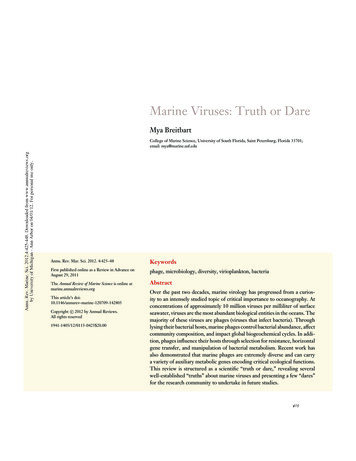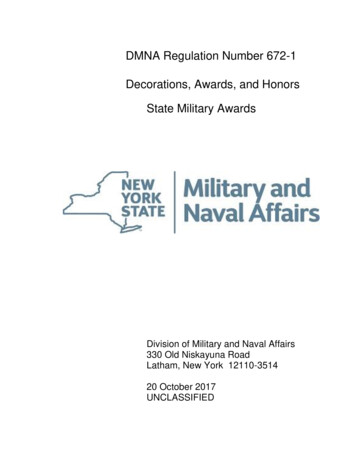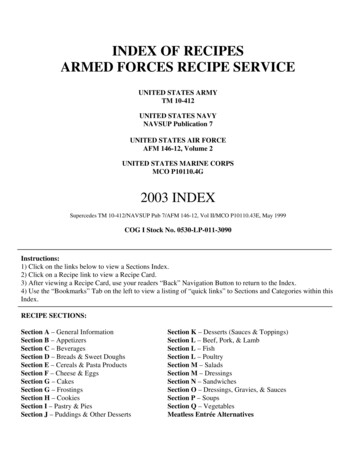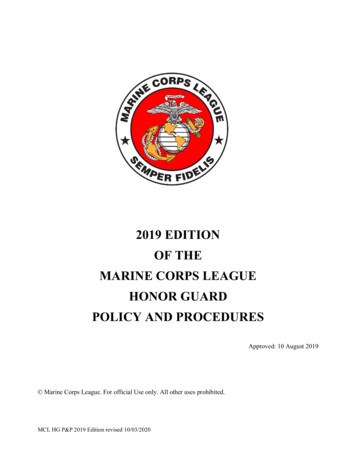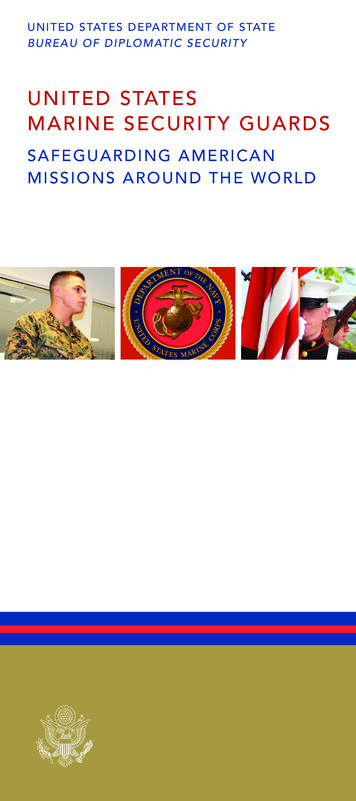
Transcription
U NIT ED STAT E S D E PART M E N T O F S TAT EBUREAU O F D I PLO M AT IC S E CUR IT YU N I TE D STATESM A RINE SE CURITY GUARDSSAFE GUARD IN G A M ERIC A NM I SSI ONS ARO U ND T HE W O RLD1
U.S. MARINE SECURITY GUARDSSAFEGUARDING AMERICANMISSIONS AROUND THE WORLDIntroductionA Marine Security Guard mans his Post 1 station at theU.S. Embassy Abu Dhabi.Introduction. 1History. 4The Program. 9The Tradition Continues. 10Contact Information. 122For over six decades, U.S. Marine Security Guards (MSGs)have worked closely with the U.S. Department of Stateand its Bureau of Diplomatic Security (DS) to protect andsafeguard American diplomacy.The primary mission of MSGsis to protect U.S. citizens andproperty as well as to preventthe compromise of classifiedU.S. Government informationunder a range of circumstances,including hostile assaults.They respond immediately tocrises large and small, includingdemonstrations, bomb threats, fires,nuclear/biological/chemical threats, and facility intrusionattempts. As such, MSGs stand as a solid line of defensefor American diplomacy.In fact, the Marine Security Guard program is a successfulpartnership between two great organizations. The U.S.Marine Corps and the U.S. Department of State each hasits own unique heritage, operational culture, and distincttraditions. Jointly funded, this program has dual chainsof authority – operational and administrative – as well asseparate applicable regulations.Marine Security Guards stationed at an embassy entranceliterally represent the face of America to members of thediplomatic community and citizens of the host country. Toeveryone who enters the embassy, they are looked upon asa symbol of American values of integrity, courage, loyalty,and commitment. As a Marine Security Guard at a U.S.embassy or consulate, they do not just stand at “Post.”They stand for America.1
At the MSG training facility in Quantico, Virginia, a seasoned MSG trainsa new Marine on the Imminent Danger Notification System in a mock-up ofa typical Post 1 communication center found at all U.S. embassies.The State Department’s Director of the Diplomatic SecurityService oversees the Marine Security Guard program.Working together, DS and the MSGs operate as a team toensure that the United States can conduct diplomacy safelyand securely around the world.DS Regional Security Officers (RSOs) in charge of theembassies’ security programs are highly trained, seasonedprofessionals and special agents of the Diplomatic SecurityService. The security programs that RSOs implement areadvanced and well-designed efforts to protect people andsafeguard property and information from terrorists, foreignintelligence agents, and criminals.2MSGs are a critical part of this security program. DSagents, engineers, technical specialists, and otherpersonnel at each post work with the MSGs on a dailybasis. DS relies on MSGs to maintain their skills by regularlyattending guard schools, response drills, familiarizationfiring, and other training programs. A Memorandum ofAgreement between the organizations governs the manydetails of the program, including fiscal responsibilities,housing, training, duties, discipline, logistical and medicalsupport, and many other areas.3
HistoryThe United States Marine Corps and the Bureau ofDiplomatic Security have had a long and mutually beneficialrelationship for more than 60 years. The Marine SecurityGuard program was formally established in December1948, and since that time, the two organizations havefaced many challenges together. In fact, this uniquepartnership has developed into one of the strongest in thehistory of U.S. civilian-military relations.During the winter of 1948-1949, the Marine SecurityGuard program was established with volunteers from theUnited States Marine Corps. When the MSG programbecame operational in 1949, only 83 Marines weredeployed. With a stroke of a pen, President Barack Obamaauthorized the addition of 1,000 MSGs as part of the2013 Defense Authorization Act, which is expected toincrease the number of MSGs to approximately 2,450 atmore than 150 MSG detachments worldwide by 2016. In abroader sense, the State Department’s relationship with theMarine Corps goes back to 1798. For more than 200 years,Marines have been engaged in some way with Americandiplomacy. U.S. Marines have been detailed as a securityforce escorting diplomatic personnel; they have rescuedand defended American embassies and consulates aroundthe globe; and in some very notable and historic actions,they have provided unique forms of support for diplomacyin various places throughout the world.During World War I, for example, Marine noncommissionedofficers acted as diplomatic couriers safeguarding thedelivery of diplomatic and confidential mail for theDepartment of State, operating in hazardous locations likerevolution-torn Russia, often with little protection otherthan their sidearms.The origins of the present-day MSG program are rooted inWorld War II, when a sixty-man Marine detachment wasassigned to guard the U.S. Embassy in war-torn London.4July 28, 1937: U.S. Marines guard the entrance to the U.S. Embassycompound in Beijing, China.After World War II, it was decided that an alert, disciplinedforce was needed to protect U.S. diplomatic missionsthroughout the world. Volunteers from the Marine Corpswere identified to fill these assignments, and the MarineSecurity Guard program was formed, ultimately becominga prestigious assignment in the Corps.5
December 1959: President Dwight Eisenhower (left)takes a salute from the Marine Security Guards ashe leaves with Ambassador Ellsworth Bunker aftervisiting the U.S. Embassy in New Delhi.As a reliable line of defense and support in U.S.embassy emergencies overseas, Marine SecurityGuards have protected State Department facilitiesagainst anti-American riots and demonstrations, andhave helped evacuate U.S. diplomats and their familiesduring times of crisis. MSGs have extinguished fires inU.S. embassies and saved countless lives of personnelthreatened by civil unrest, earthquakes, and floods.The courage and support of the MSGs has beenconstant in every situation.They stood side-by-side with the State Departmentthrough horrific events like the bombings of the U.S.Embassies in Nairobi and Dar es Salaam in 1998. Theyproved their indispensability again when terroristsattacked the U.S. Consulate in Jeddah, Saudi Arabia, in2004. The MSG response to that attack was focused,fast, and professional; it helped stop the attackersfrom entering the consulate building, undoubtedlysaving many lives. They continue to protect America’sdiplomatic missions from other hostile challenges aswell, such as the protests and violence directed againstnumerous American facilities in 2012.67
U.S. Secretary of State John Kerry shakes hands with Marine Security Guardsat U.S. Embassy Baghdad in March 2013.Indeed, this mission is more important than ever in thecurrent threat environment. As the world has witnessedall too clearly and too often, determined terrorists will nothesitate to harm innocent citizens, including professionaldiplomats, at any vulnerable location in the world.Today, MSGs are recognized as the professional,well-trained, disciplined guard force that is best suitedfor providing internal security at U.S. embassies andconsulates. Time and time again, Marine Security Guardshave lived up to the Marine Corps credo, “Semper Fidelis.”They have, in fact, always remained faithful to U.S.Diplomatic Security and to American diplomacy.8The ProgramThe Marine Corps Embassy Security Group, as it is knowntoday, comprises a select group of men and womenwho have been specially trained for this duty. Well overa thousand officers and enlisted Marines are assigned tothe Marine Corps Embassy Security Group at Quantico,Virginia; to its Regional Commands; and to the MarineSecurity Guard detachments located at U.S. embassies andconsulates around the globe. A new detachment, calledMarine Security Augmentation Unit squads, was createdin 2013 to provide augmented support, wherever andwhenever needed.9
Standing duty 24 hours each day, seven days a week, theyprotect U.S. Government personnel and property in everyhostile situation. In the event of an attack, Marine SecurityGuards deter the aggressors to safeguard diplomaticpersonnel and classified information.MSGs also control access within U.S. missions. Theyconduct inspections to ensure that classified informationis secure, and they monitor surveillance devices and firealarms. They are the focal point for all post emergencycommunications. As such, they perform an essential role inhelping our country achieve its goals in world affairs.The MSG program offers a great opportunity to travel,learn new languages, experience new cultures, and makenew friends. MSGs experience an exciting adventure atU.S. embassies and consulates throughout the world. Notonly do they meet the U.S. personnel and their familiesassigned to the diplomatic posts, they also get to knowthe local national employees who work in the Americanfacilities. Being part of the State Department diplomaticsecurity team, they acquire a wealth of knowledge aboutlocal customs and attitudes.The Tradition ContinuesMarine Security Guards are one of America’s greatestassets abroad. The U.S. Department of State and itsDiplomatic Security team honor and respect MSG devotionto duty, honor, and country as together they work tosupport freedom and stability in the 21st century.The MSGs who have gone before have heroicallyensured the safety and security of U.S. diplomatic postsabroad. Marine Security Guards today, through theirprofessionalism, dedication, and faithful support, carry onthat powerful and noble tradition.10Marine Color Guards perform at a dedication ceremony of the newU.S. Embassy Macedonia on July 2, 2009.11
“I have an unqualifiedrespect for their dedication,discipline, and devotion.”—A U.S. CONSUL IN AFRICA TALKING ABOUTTHE MARINE SECURITY GUARDSContact Information:Diplomatic Security, MSG Branch1800 N. Lynn StreetArlington, Virginia 22209(571) 345-2755MCESG Headquarters2007 Elliot RoadQuantico, Virginia 22134(703) 784-3268http://www.mcesg.marines.mil/Photo CreditsPage 5, 6, 8, 11: AP/Wide WorldPages 1, 12: United States Marine CorpsAll other photos: U.S. Department of State3
United States Department of StateBureau of Diplomatic SecurityPublic AffairsWashington, DC 20522-2008www.diplomaticsecurity.state.govPh: 571-345-2502Revised November 20134
the Marine Corps Embassy Security Group at Quantico, Virginia; to its Regional Commands; and to the Marine Security Guard detachments located at U.S. embassies and consulates around the globe. A new detachment, called Marine Security Augmentation Unit squads, was created in 2013 to

